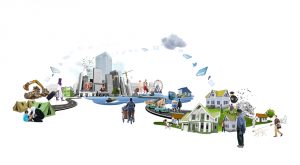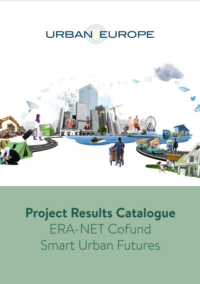
The ERA-NET Cofund Smart Urban Futures call initiates transnational joint calls for RDI proposals, developing our knowledge of the urban condition and sustainable development through creation and testing of new methods, tools, and technologies required to overcome current economic, social, and environmental challenges. ENSUF is supported by the European Commission and funded under the Horizon 2020 ERA-NET Cofund scheme. The call was opened on 16 December 2015 and in December 2016 15 projects were approved and started at the beginning of 2017. ENSUF Final Event took place on 29 September 2020- read more here.
Introduction
Europe is today fully immersed in the urban age, with 80 per cent of its citizens living in cities and urban areas. European cities and urban areas are the main drivers of economic development and growth, knowledge and creative generation/production, innovation and benefactors for the liveability. However, cities are not yet sustainable in a broad and substantial sense and also contribute to deprivation, poor health and environmental damage. Therefore there is an identified need for integrative procedures in how to conceive new knowledge and implement new solutions to tackle transition pathways.
Current sector-specific initiatives and priorities are mostly elaborated in isolation from each other. Moreover, the overall challenge today is to move to action through dialogue: from a sector oriented technocratic approach to one that recognises more diverse viewpoints and rationalities. The call topics will enable participants to develop projects that aim for substantial impact in shaping smart urban futures.
Call topics
Topic 1: Concepts and strategies for smart urban transformation, growth and shrinkage
European cities and urban areas show very diverse dynamics: growth, stability or even shrinkage in population, activities and revenue, aging and rejuvenating urban populations etc. While patterns of transformation, growth and shrinkage certainly pose challenges to cities across Europe, they also offer opportunities to increase awareness of their strengths and weaknesses, and use the transition process to create a smart and robust urban ecosystem, with better integrated infrastructures and institutions.
Topic 2: New dynamics of public services
In recent decades many urban areas in Europe have seen a significant change in the structure and organisation of public service provision. Recent circumstances and dynamics stemming from economic, social and environmental trends intensify the necessity to rethink traditional models. This topic is included to help to develop new and innovative approaches in the realm of public services which in turn will increase the capacity of urban areas to answer local challenges. There is a disconnection between the current state of knowledge in models and visions for public services required for sustainable urban development and the implementation of this knowledge into the planning, management and delivery of services. The development of new ways of active participation and co-creation and the optimal use of open data can help address urban challenges and bridge the implementation gap
Topic 3: Inclusive, vibrant and accessible urban communities
Cities play an active role in shaping the connections and social processes which take place within them. Urban planning, design, and governance can help to support creative and inclusive communities, or they can literally build walls between groups and close down possibilities for interaction and innovation. This topic examines the everyday needs and challenges facing different social and cultural groups in the city, and how individual and community practices, urban governance, businesses, infrastructures and urban regeneration can support sustainable urban development and the peaceful integration of diverse communities.
Funded projects
BRIGHT FUTURE
CAPA.CITY
Cities of Making
C3Places
FloodCitiSense
FLOODLABEL
GLIMER
LOOPER
PLACED
SoHoLab
Smart Pedestrian Net
Smart UrbI
SMART-U-GREEN
3S RECIPE
Urban Education Live
>> Search for projects in other calls
Project Posters (2017)
You can find project posters here
Special edition results newsletter (2020)
You can read a special edition newsletter to celebrate the 15 finalised projects in ERA-NET Cofund Smart Urban Futures (ENSUF), here.
20 results interviews with projects
Read the interviews with finalised projects.
Policy recommendations (2020)
The majority of projects have put forward different kinds of policy recommendations, we have gathered the majority of them here.
A synthesis report is being developed in ENSUF 2020- 2021.
Projects Results Catalogue
Access the projects results catalogue in ENSUF, produced in 2020.
Synhtesis report (2021)
Read the ENSUF synthesis here
ENSUF call events and meetings
Kick-off event (2017)
Midterm event (2019)
Final event (2020)
Synthesis webinar (2021)
——————————————————–
Call information & documents
PDF ENSUF Info Flyer
Download the complete ENSUF Call Text: PDF ENSUF Call Text
Funding Agencies
National contact points of participating FAs
Austria (FFG)
Belgium (FWO, Innoviris, FNRS)
Cyprus (RPF)
Denmark (IFD)
France (ANR)
Finland (TEKES, AKA)
Italy (MIUR)
Latvia (VIAA)
Lithuania (LMT)
The Netherlands (NWO)
Norway (RCN)
Poland (NCN)
Portugal (FCT)
Romania (UEFISCDI)
Slovenia (ARRS)
Sweden (Formas, Swedish Energy Agency, Vinnova)
Turkey (TÜBITAK)
United Kingdom (AHRC, EPSRC, ESRC)
Call secretariat
If you have questions please contact the JPI Urban Europe Call Secretariat:
Johannes Bockstefl, FFG – Austrian Research Promotion Agency
+43 5 77 55 5042
johannes.bockstefl@ffg.at
Vincent Van Doninck, Dutch Research Council (NWO)
+31 70 349 42 66
v.vandoninck@nwo.nl


